Morocco stands as a vibrant tapestry of diverse landscapes where ancient traditions meet modern sustainability efforts. From the snow-capped Atlas Mountains to the golden Sahara dunes and azure coastal towns, this North African gem offers eco-conscious travelers an authentic journey through natural wonders and cultural heritage. The growing interest in ecotourism in Morocco reflects a global shift toward responsible travel that preserves environments while supporting local communities.
This guide explores how you can experience Morocco’s breathtaking beauty while treading lightly on its precious ecosystems. Discover eco-certified accommodations, community-based tourism initiatives, and sustainable travel practices that allow you to connect deeply with Morocco’s landscapes and people while contributing positively to their future.
Key Ecotourism Destinations in Morocco
The majestic High Atlas Mountains offer sustainable trekking experiences through Berber communities
High Atlas Mountains: Community-Based Trekking
The High Atlas region represents the heart of Morocco’s ecotourism movement. Here, community-based tourism initiatives have transformed traditional Berber villages into sustainable travel destinations. Local guides lead treks through ancient paths, sharing indigenous knowledge about the mountain ecosystem while ensuring minimal environmental impact.
Toubkal National Park, home to North Africa’s highest peak, has implemented strict conservation measures to protect its unique flora and fauna. Visitors can participate in responsible trekking programs that support local economies while preserving natural habitats. Many communities have established cooperatives that provide authentic homestays, allowing travelers to experience traditional Berber hospitality while ensuring tourism benefits flow directly to local families.
Ready to explore Morocco’s mountain wonders?
Discover more sustainable mountain destinations and community-based tourism initiatives.
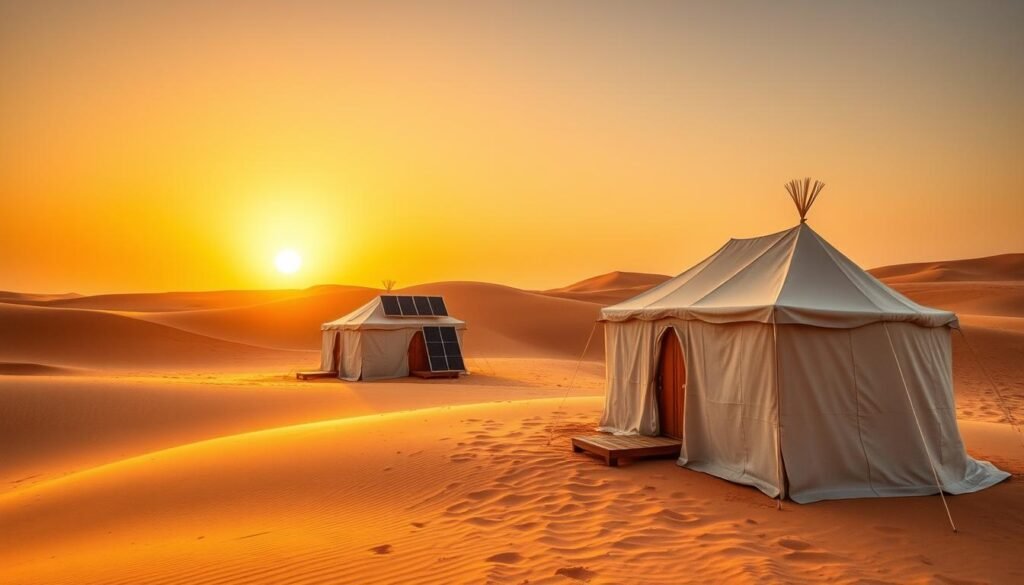
Solar-powered desert camps offer sustainable accommodation in the Sahara
Sahara Desert: Sustainable Desert Tourism
Morocco’s portion of the Sahara Desert has seen remarkable innovations in sustainable tourism. Eco-camps powered by solar energy have replaced generators, dramatically reducing carbon footprints in this fragile ecosystem. Local Amazigh guides lead camel treks that follow traditional routes, minimizing impact on the desert landscape while sharing their deep cultural connection to this environment.
Conservation efforts focus on protecting desert biodiversity and combating desertification. Many tour operators now participate in dune conservation programs and limit group sizes to reduce environmental pressure. Visitors can experience the magic of the Sahara while contributing to its preservation through responsible tourism practices that respect both the natural environment and the indigenous cultures that have sustainably inhabited these lands for centuries.
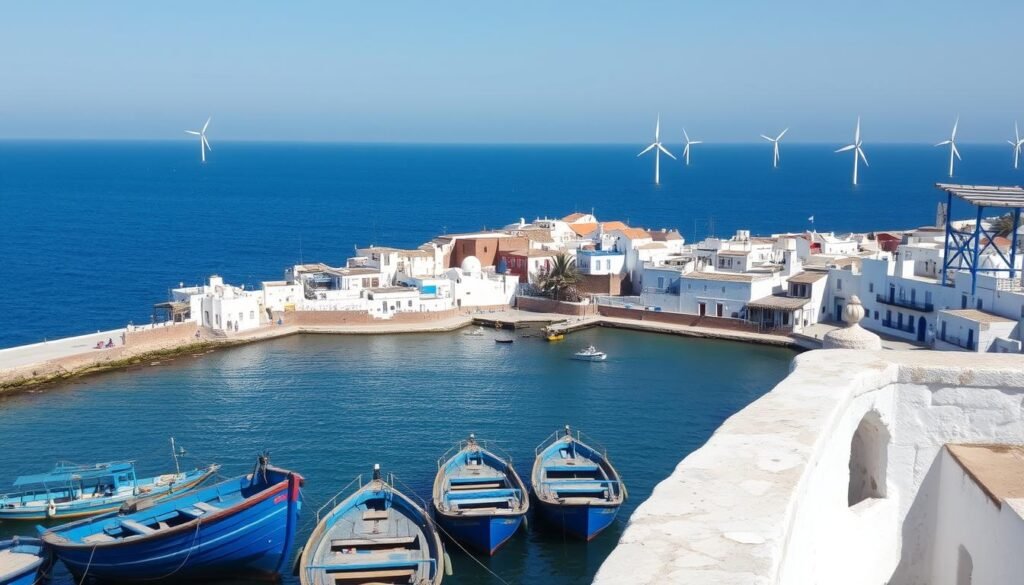
Essaouira combines traditional fishing culture with renewable wind energy
Essaouira: Coastal Sustainability
This charming coastal town has embraced sustainable development through innovative approaches to energy and waste management. Essaouira harnesses its abundant wind resources through turbine farms that provide clean energy to the region. The town’s commitment to preserving its traditional fishing industry while developing sustainable tourism offers visitors an authentic cultural experience with a reduced environmental footprint.
Local artisanal cooperatives, particularly those empowering women, create handcrafted products using sustainable materials and traditional techniques. These initiatives provide economic opportunities while preserving cultural heritage. Visitors can explore the UNESCO-protected medina, enjoy fresh seafood sourced through sustainable fishing practices, and support local craftspeople who maintain generations-old traditions with environmentally conscious approaches.
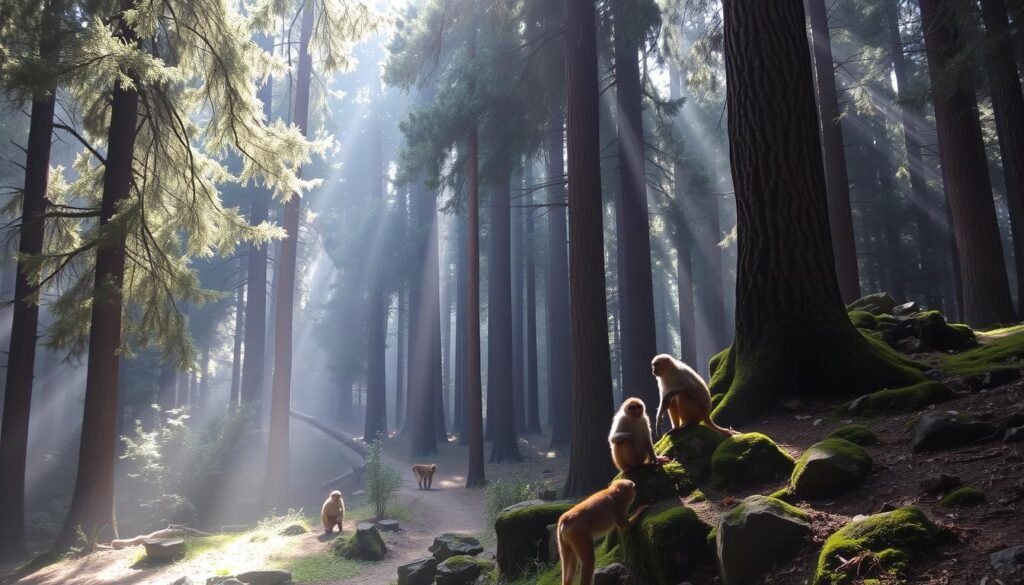
Ifrane National Park protects vital cedar forests and endangered Barbary macaques
Ifrane National Park: Biodiversity Conservation
Often called “Morocco’s Switzerland,” Ifrane National Park represents a crucial biodiversity hotspot. The park’s ancient cedar forests provide habitat for the endangered Barbary macaque and numerous bird species. Conservation efforts focus on protecting these forests from climate change impacts and unsustainable harvesting while developing responsible wildlife tourism.
Guided nature walks led by trained local rangers educate visitors about the park’s ecological importance while ensuring wildlife viewing follows ethical practices. The park’s management collaborates with surrounding communities to develop sustainable livelihoods that reduce pressure on forest resources. This model of conservation demonstrates how ecotourism in Morocco can successfully balance environmental protection with community development.
Sustainable Accommodations and Practices
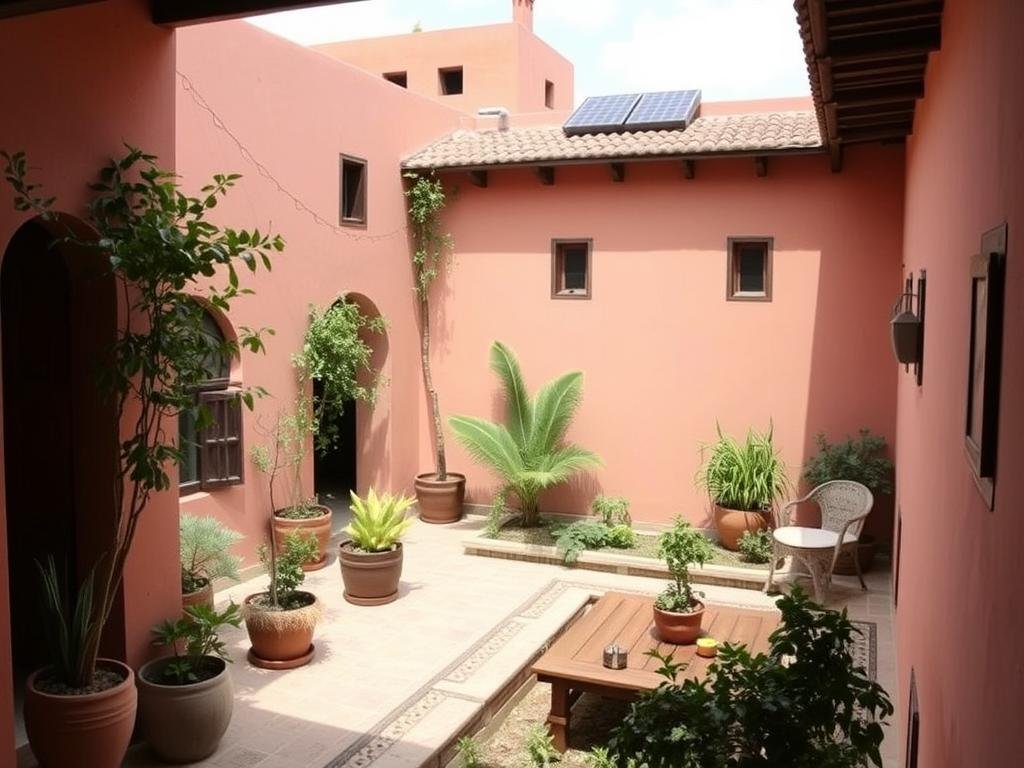
Eco-lodges combine traditional Moroccan architecture with sustainable technologies
Eco-Certified Accommodations
Morocco has developed a robust eco-certification system that recognizes accommodations meeting strict sustainability criteria. The “Green Key” ecolabel, highlighted in Morocco’s tourism strategy, identifies establishments that implement water and energy conservation, waste reduction, and support for local communities. These certified properties range from luxury ecolodges to community-run guesthouses, offering sustainable options for every budget.
Kasbah du Toubkal
This mountain retreat in the High Atlas operates as a “Berber hospitality center” rather than a hotel. It employs local staff, sources food locally, and invests profits in community development projects. The Kasbah uses solar power, practices water conservation, and offers authentic cultural experiences managed by local communities.
La Pause Agafay
Located in the Agafay desert near Marrakech, this ecolodge offers an off-grid experience with candlelit accommodations in traditional tents. The property uses no electricity, sources water from wells, implements drip irrigation for its organic garden, and employs sustainable building techniques using local materials.
Dar Itrane
This eco-friendly refuge in the Dadès Valley blends into the landscape with its traditional stone and earth construction. The lodge supports the local village of Imelghas through employment opportunities and cultural exchange. Solar power, water conservation systems, and organic food production demonstrate its commitment to sustainability.
Find your perfect sustainable stay in Morocco
Discover more eco-lodges that combine comfort with environmental responsibility.
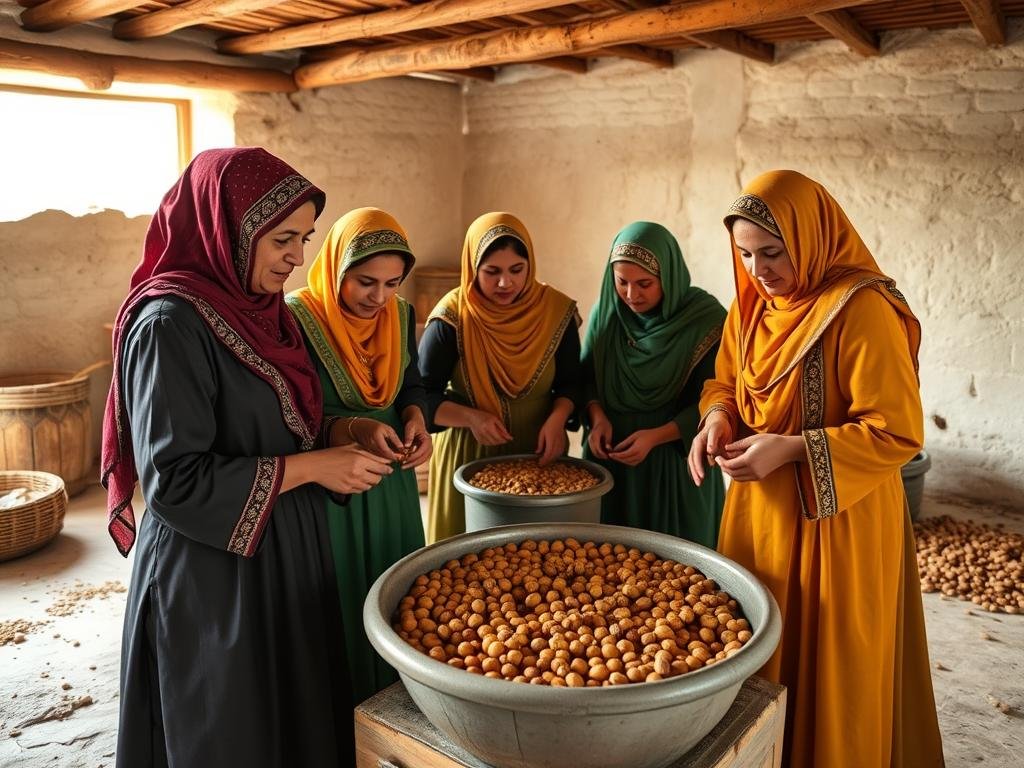
Women’s cooperatives provide sustainable livelihoods through traditional argan oil production
Community-Based Tourism Initiatives
Morocco’s community-based tourism initiatives empower local populations while preserving cultural heritage. Women’s cooperatives producing argan oil offer visitors authentic experiences while providing sustainable income for rural communities. These cooperatives maintain traditional production methods while implementing fair trade practices that ensure equitable distribution of tourism benefits.
Amazigh cultural tours led by indigenous guides share authentic traditions while supporting cultural preservation. Many communities have developed homestay programs that allow visitors to experience daily life while ensuring tourism revenue directly benefits local families. These initiatives represent the heart of ecotourism in Morocco, creating meaningful connections between visitors and host communities while supporting sustainable development.
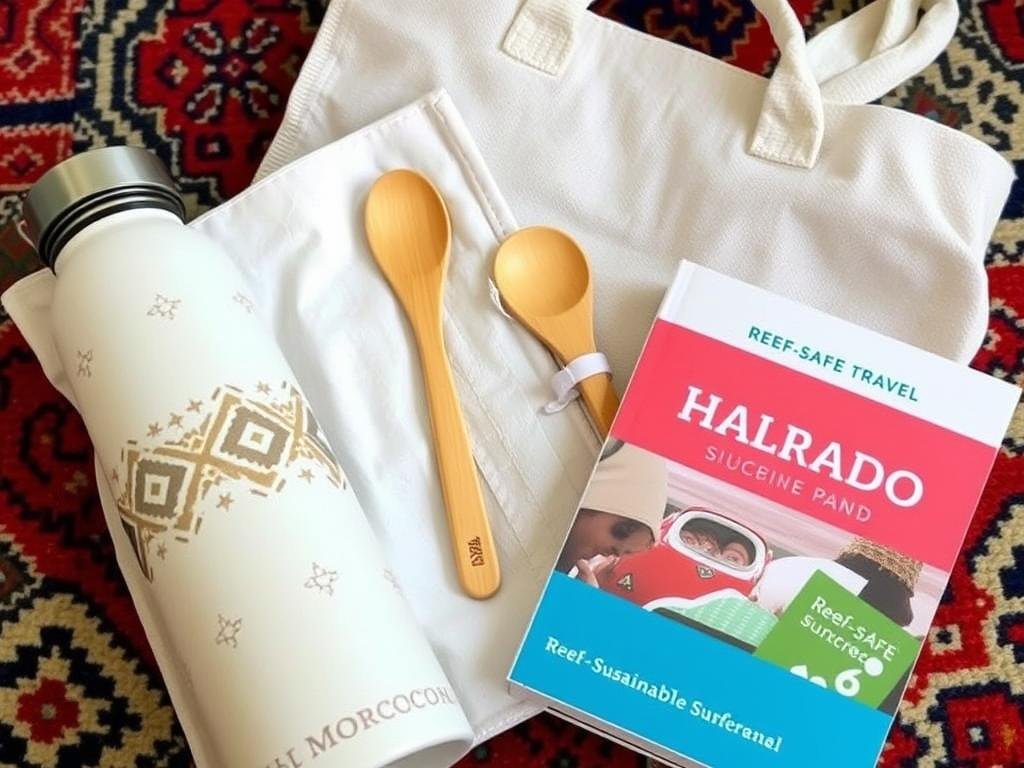
Sustainable travel essentials for minimizing environmental impact in Morocco
Green Travel Practices
Responsible travelers can significantly reduce their environmental footprint in Morocco through thoughtful practices. Carrying reusable water bottles with portable filters addresses plastic pollution while ensuring safe drinking water. Many eco-conscious accommodations now provide water refill stations to support this practice.
Supporting local artisans who use sustainable materials preserves traditional crafts while reducing the environmental impact of souvenirs. Choosing locally-owned restaurants that source ingredients from nearby farms reduces food miles while providing authentic culinary experiences. Using public transportation or shared vehicles for longer journeys minimizes carbon emissions while offering opportunities to connect with local people.
“Ecotourism in Morocco is not just about preserving nature—it’s about respecting the deep connection between landscapes, traditional knowledge, and sustainable livelihoods that Moroccan communities have maintained for centuries.”
Practical Advice for Eco-Conscious Travelers
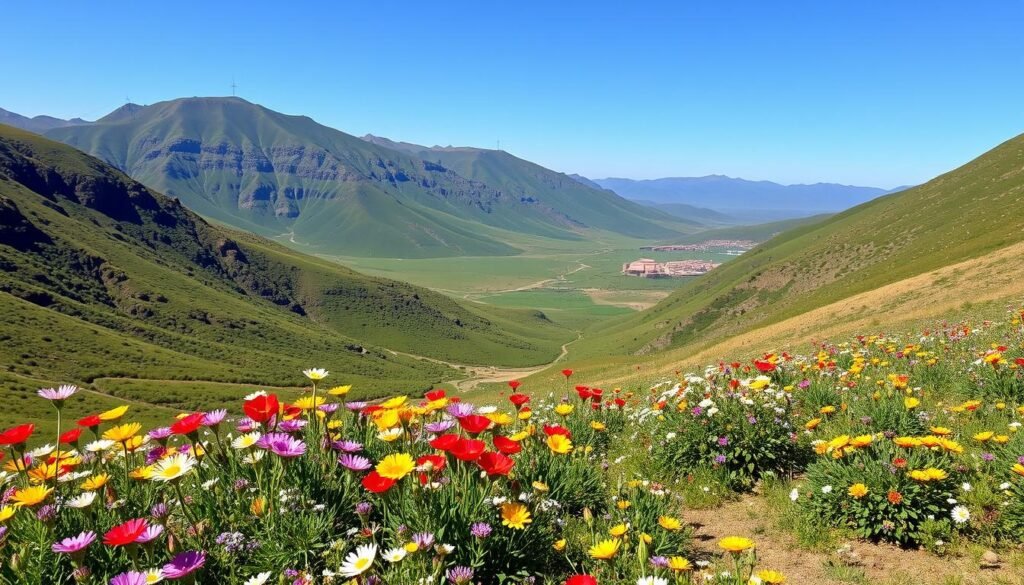
Spring brings ideal conditions for sustainable hiking in the Atlas Mountains
Best Times to Visit for Ecotourism
| Season | Months | Ideal Regions | Ecotourism Activities | Sustainability Notes |
| Spring | March-May | Atlas Mountains, Coast, Northern Morocco | Hiking, birdwatching, cultural festivals | Peak wildflower blooms, less water stress on communities |
| Summer | June-August | Coastal areas, High Atlas (above 2000m) | Coastal conservation, high mountain treks | Avoid desert regions, high water consumption period |
| Fall | September-November | All regions, ideal for desert | Desert trekking, harvest festivals, wildlife viewing | Balanced tourism distribution, harvest season supports local food |
| Winter | December-February | Desert, Southern Morocco, lower elevations | Desert ecology tours, cultural immersion | Low season helps distribute tourism impact, less crowding |
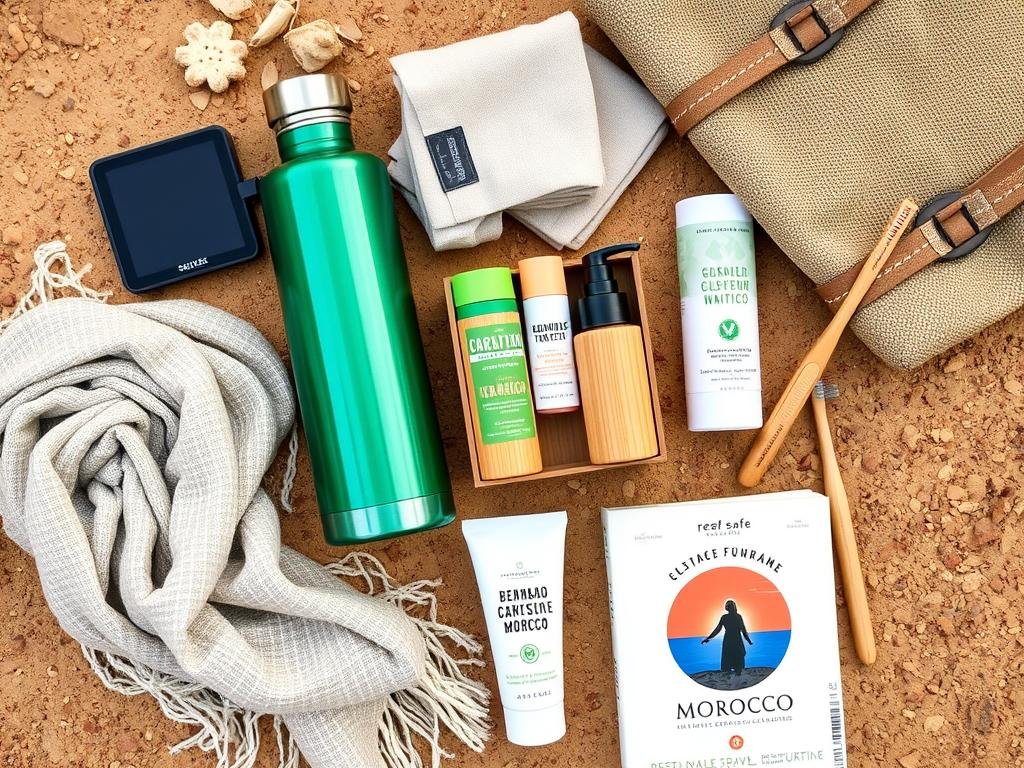
Essential eco-friendly packing items for responsible travel in Morocco
Sustainable Packing List
Essential Eco-Friendly Items:
- Reusable water bottle with filter (crucial for reducing plastic waste)
- Biodegradable toiletries in refillable containers
- Solar charger for electronics (especially useful in remote areas)
- Reusable shopping bag for souvenirs and market purchases
- Reef-safe sunscreen for coastal activities
- Bamboo utensils and reusable food containers
Culturally Respectful Clothing:
- Lightweight, modest clothing covering shoulders and knees
- Natural fiber garments (cotton, linen) for breathability
- Multi-purpose scarf/shawl for sun protection and mosque visits
- Comfortable closed-toe walking shoes for varied terrain
- Sun hat made from sustainable materials
- Lightweight rain jacket (especially for mountain regions)
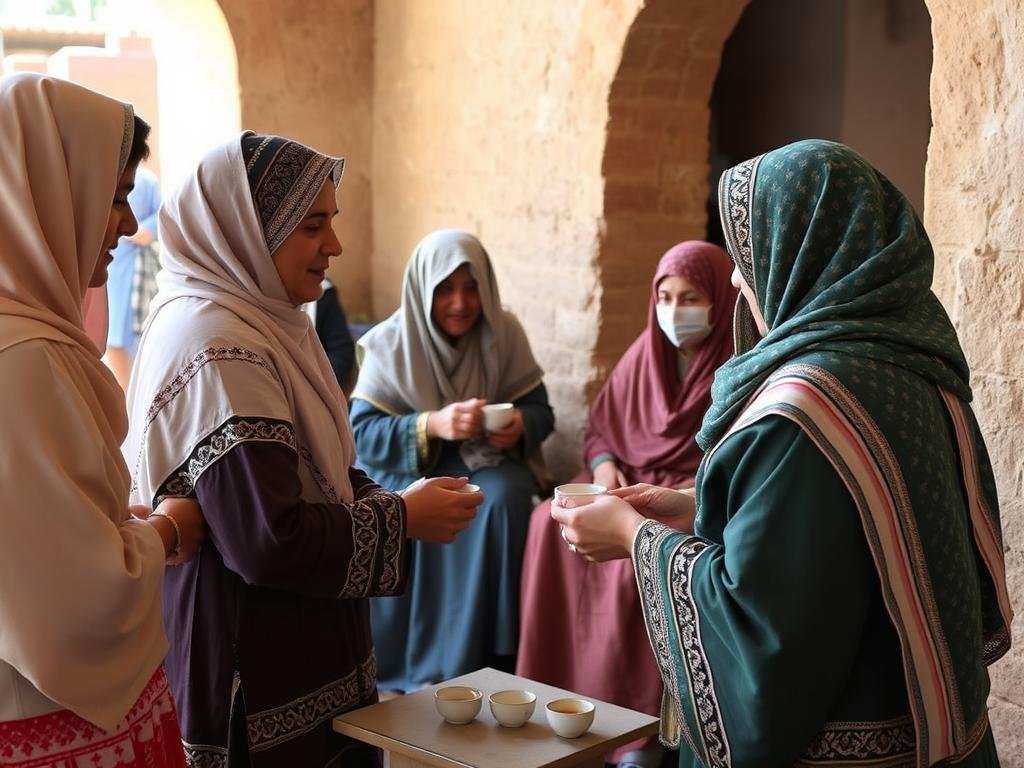
Respectful cultural exchange is a cornerstone of sustainable tourism in Morocco
Cultural Sensitivity and Community Support
Respecting Morocco’s cultural norms enhances both your experience and your positive impact. Learning basic Arabic or Amazigh phrases demonstrates respect and facilitates meaningful connections. Common greetings like “As-salamu alaykum” (peace be upon you) and “Shukran” (thank you) are appreciated throughout the country.
Supporting local artisans preserves traditional crafts while ensuring tourism benefits reach communities. When purchasing souvenirs, look for authentic handmade items and be prepared to engage in respectful bargaining, which is a cultural tradition. Many cooperatives now offer fixed prices that ensure fair compensation for artisans while eliminating the need for negotiation.
Understanding appropriate tipping practices helps support service workers fairly. In restaurants, 10% is customary for good service. For guides and drivers who enhance your ecotourism experience, 100-200 dirhams per day demonstrates appreciation for their knowledge and assistance.
Sustainable Tourism Certification
Look for accommodations and tour operators with recognized certifications like Morocco’s “Green Key” ecolabel, which ensures compliance with environmental standards. These certifications verify genuine commitment to sustainability rather than greenwashing. Certified businesses typically implement water conservation, energy efficiency, waste reduction, and community support initiatives.
Embracing Morocco’s Sustainable Future
Morocco stands at the forefront of sustainable tourism development in North Africa, balancing economic growth with environmental protection and cultural preservation. The country’s commitment to renewable energy, exemplified by the Noor solar plant in Ouarzazate and wind farms in Tétouan, demonstrates its leadership in addressing climate challenges. These initiatives complement ecotourism by reducing the carbon footprint of the tourism sector.
As a traveler, your choices significantly impact this sustainable trajectory. By selecting eco-certified accommodations, supporting community-based tourism initiatives, and practicing responsible travel behaviors, you contribute to Morocco’s vision of tourism that benefits both people and planet. The authentic connections you forge with local communities and natural landscapes will undoubtedly become the most treasured souvenirs of your journey.
Ecotourism in Morocco offers more than just a vacation—it provides an opportunity to participate in a movement that honors traditional wisdom while embracing innovative solutions for a sustainable future. As you explore this magnificent country, remember that each mindful step leaves a positive imprint on the landscapes and communities that make Morocco truly extraordinary.
Ready to experience sustainable Morocco?
Discover eco-friendly destinations and accommodations for your next adventure.

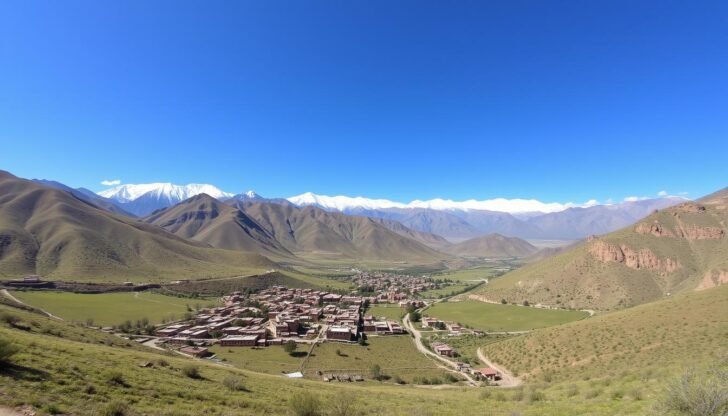











[…] Kasbah du Toubkal – Morocco […]